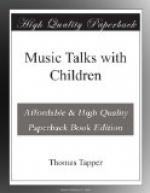We must also listen to tones so that we can tell something about them besides their scale names. We must learn to describe tones, tell whether they are high or low, sweet or harsh, loud or soft, long or short. For instance, through the window I can hear a church-bell. Some one is ringing it slowly so that the tones are long. The tone is not a very high one (it is G above middle C) and the quality is rich and mellow. This describes the church-bell tone quite well, and in like manner we may describe all the sounds we hear. We should make it a habit often to stand or to sit perfectly still and to listen to everything that goes on about us. Even in the country, where all seems as quiet as possible, we shall be surprised at the great number of sounds.
There are some other tones to which I fear we are prone not to listen. I mean the tones which the piano makes when we play finger-exercises. We think perhaps of the finger motion, which is not all; or we think of nothing, which is very bad; or our thoughts begin to picture other things even while we play, which is the worst of all, and bit by bit we actually forget what we are doing. One of the quickest ways to become unable to hear sounds correctly is to play the piano without thinking fully of what we are doing. Therefore it must be a rule never to play a tone without listening acutely to it. If in the first days we determine to do this and remain faithful to it, we shall always touch the piano keys carefully, thoughtfully, and reverentially.
Elsewhere we shall have some definite tone lessons for the purpose of making us familiar with the tones about us. But no rule can exceed in importance this one, never to make any music unthinkingly.
By care and practice we soon become so skilful as to notice tones with the readiness we notice colors in the garden. The sense of tone must be as strong in us as is the sense of color. Then we shall be able to tell differences of tones which are nearly the same, as readily as we can now tell two varieties of yellow, for instance. A bit of perseverance in this and the beauties even of common sounds shall be revealed to us.
CHAPTER V.
LISTENING.
“You must listen as if listening
were your life.”—Phillips
Brooks.[14]
In our last Talk we learned that it was quite possible for sounds to be about us and yet we not hear them. Sometimes, as in the case of Tyndall’s companion, it is because we are not capable; at other times, as when the clock strikes and we do not hear, it is because we are occupied with other things. It is from this latter fact—being occupied with other things—that we can learn what listening is. Listening is not being occupied with other things. It is being completely attentive to what we are expected to hear.
The condition of being occupied with other thoughts when we should be listening is known as inattention. To listen with full attention, all other things being entirely absent from the mind, is one form of concentration.




